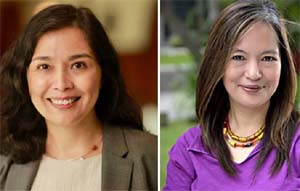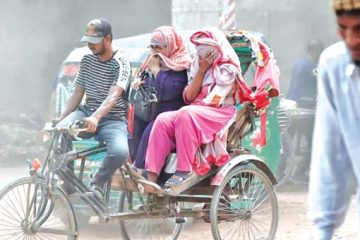Opinion
Veronica Mendizabal Joffre and Pinky Serafica
Can we truly reimagine a path to a low-carbon transition and change the climate narrative? This is hard to envision when we witness the unprecedented damage we are inflicting on the planet.
For women, the effects of climate change are already a lived experience. Where environments are damaged and traditional sources of livelihood disappear, women must scrounge farther and travel wider to meet the needs of communities. As new diseases emerge from the imbalance in the natural world, women must grapple with the care and health of their families.
Gender inequality is at the core of women bearing the burden of climate change. Already vulnerable from multiple inequalities, for women there is no debate: transitioning to low-carbon and climate-resilient communities is urgent.
By now, everyone has climate stories hitting home. This has resulted in a momentum for a low-carbon future. But the transformations required will not pan out similarly for everyone. The thick layer of social and economic inequality determines winners and losers in the process.
This is why the transition to a low-carbon economy needs to be consciously designed to be socially equitable and inclusive–a just transition. Moreover, the transition cannot be gender-neutral and must be gender-just.
We propose that governments and other stakeholders take these actions to achieve a gender-just transition:
Accelerate access to clean energy for all: Reliable and affordable supply of energy is critical for the socio-economic development of communities and has a multi-faceted dimension for women. Electricity can enable businesses and education, cleaner energy for cooking and heating reduces indoor air pollution, and electric appliances can reduce unpaid household work.
Information technology expands networks, and greener mass transportation and safer active mobility (i.e., electric vehicles, cycling) can increase women’s freedom of movement.
But with seven years remaining to meet the 2030 sustainable development goal of access to affordable, reliable, sustainable energy for all, about 730 million people still lack basic access. The diversification and decarbonisation of the energy systems must include targeted support for the poorest so they can obtain and maintain affordable access to energy. We must keep in mind that changes in energy costs can affect women differently as globally, on average, women still earn 20 per cent less than men.
Increase women’s share in green employment: With the region relying heavily on fossil fuels for energy, the retiring of coal- and oil-fired facilities will result in job losses and socio-economic consequences down the line. While green jobs and investment opportunities are expected, social protection is critical to mitigate the displacement of workers and the informal sectors dependent on these industries.
Women make up only 32 per cent of the workforce in the renewable energy sector; and only about 11 per cent of energy sector start-up founders. The gender wage gap in the sector is estimated at 31 per cent, and women are more likely to be employed in lower-paid and administrative positions than in technical, managerial or policy-making positions.
While we know that current supply of green talent will not meet the demand, not enough women are moving into green jobs. In 2021, there were 62 women considered “green talent” for every 100 men.
The private sector must act quickly to set up human resource standards that can encourage more women to join transition-related jobs. Key actions include addressing workplace harassment and gender pay gaps, accounting for unpaid care roles, and supporting women’s leadership.
Support more women in education relevant to the transition: Transitioning to low-carbon livelihoods will, in the interim, interrupt supply chain and employment streams in the short and medium term. Options to diversify livelihoods have to be explored. Workers are needed to fill in the new types of jobs required for the transition–many in science, technology, engineering and mathematics (STEM) fields.
Globally, only around 30 per cent of female students choose science, technology, engineering and mathematics (STEM) fields of study. Southeast Asia shows some variation in the share of women graduating in STEM fields, from about 17 per cent in Cambodia to 37 per cent in Indonesia.
While there has been progress, the narrative on gender stereotypes has to change for more women to pursue STEM careers, and to venture into the potential of upskilling and reskilling. We also need to bring about greater climate awareness in the education system, and gender issues in climate can be made part of the curriculum in higher secondary education.
Fully engage and amplify women’s voices: A just transition needs the full engagement and voices of women and vulnerable sectors to shape and monitor transition plans so no one is left behind. Communication is crucial to make informed choices, change behaviors in energy consumption and mobility, and break down barriers that prevent women from entering STEM fields and transitioning into green jobs.
Communication can mobilise women and amplify their voices to influence policies on social protection and fair wages. It can facilitate storytelling about nature-based solutions and indigenous knowledge systems, and help rally sectors to change the climate narrative in the region.
Climate change is a crisis that affects women profoundly. Gender equality dimensions must be fully integrated into climate-oriented projects.
Just as the private sector plays a key role in a just transition, development organisations must also step up with solutions such as the ADB-backed Energy Transition Mechanism, which speeds up the retirement of coal, oil, and diesel plants and attracts financing for sustainable and renewable energy.
This type of path-breaking initiative increases the opportunity for an inclusive and gender-just climate transition.
Pinky Serafica is senior communications officer of the ADB and Veronica Mendizabal Joffre is a senior gender and social development specialist at the Southeast Asia Department of the ADB.








